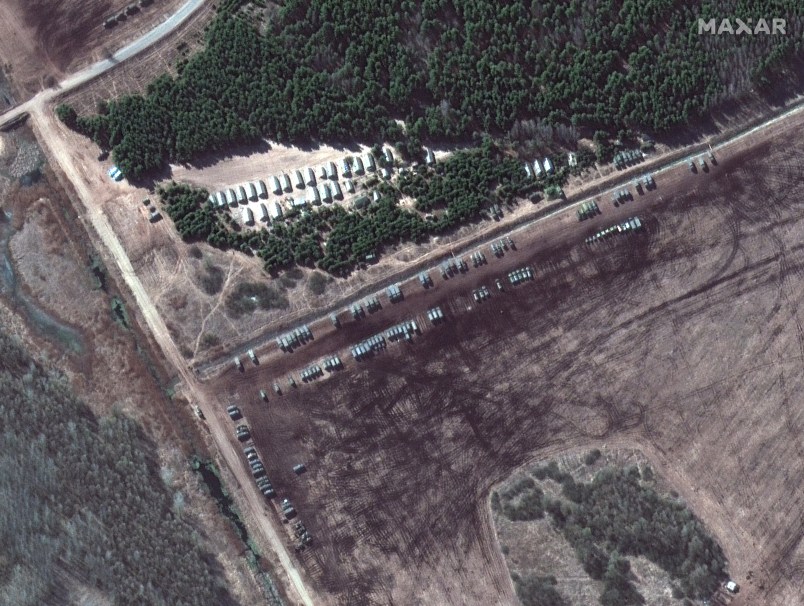There’s a lot of talk around the Russia-Ukraine war spiraling out of control.
Could Russia attack NATO supply lines? What about a stray missile flying into Poland? Cyberattacks on Wall Street or local power supplies? Chemical weapons use on Ukrainian cities?
It all falls under the rubric of escalation, a broad term that signifies a head-spinning array of possibilities.
It’s gained particular attention in recent days as more and more military analysts and western officials argue that Russian troops may be hitting a stalemate in Ukraine, contending that the Kremlin may see a way out by raising the stakes.
“It’s the biggest question in this entire crisis and conflict,” Aaron David Miller, a former State Department negotiator, told TPM. “We have not seen a situation where one human on the planet kept the world on the edge of its collective seat now for well over a month.”
Different experts in international relations and the Ukraine situation discussed how to think about escalations risks from the conflict.
Horizontal or Vertical Escalation?
The question partly comes down to the concepts of horizontal escalation versus vertical escalation.
In vertical escalation, one side intensifies the conflict on a battlefield that already exists. Russia switching tactics within Ukraine to start bombing hospitals and flattening cities is vertical escalation.
“There’s a battlefield logic to vertical escalation, and arguably we’ve seen it already,” Sam Charap, senior political scientist at the RAND Corporation, told TPM.
Other threats, like the use of a tactical nuke or chemical weapon within Ukraine, would also be a vertical escalation. Miller suggested that either could become more likely if a stalemate hardened.
A horizontal escalation broaden the geography of the conflict: think Russia attacking Poland, drawing NATO into the conflict.
“There’s less of a direct military need for horizontal escalation,” Charap argued. “My view is that it would only come if there were specific reasons that Russia felt compelled to do so, basically, if they thought NATO was about to intervene, and they needed to preempt that, or if the military assistance was posing such operational challenges that they felt they needed to do something about it.”
Accidental Escalation
Escalation can be calculated, but it can also take place inadvertently.
Missiles can fly into the airspace of other countries by accident, for example. There have already been several cases, for example, of allegedly Russian drones flying into NATO states that border Ukraine.
The U.S. has set up a deconfliction line that would in theory help to iron out any miscommunications that might arise between Russia and the NATO alliance during the Ukraine war.
But it doesn’t account for the more pernicious element of inadvertent escalation: when intentional actions are misinterpreted or have unforeseen consequences, leading to an unintentional escalatory spiral.
Jeffrey Edmonds, a Russia military analyst at CNA, raised this prospect in a conversation with TPM last month.
“The big escalation risk that I worry about is us dropping sanctions that cause a bank run,” he said. “You end up having instability, people in the streets because they can’t buy anything, and then the Russians see it as a threat to their regime.”
In that scenario, measures intended to hamstring Russia’s economy would have been seen as going far deeper – a strike on the existence of Russia’s current government.
Kinetic v. Non-Kinetic Escalation
Ukraine and its allies have already escalated the conflict in non-kinetic ways through sanctions regimes. But non-kinetic escalation could provoke a kinetic response.
“We’ve hit them non-kinetically – and really hard!” Charap said. “So you can imagine what the discussion is in the Russian government right now, what forms of retaliation are being discussed – it’s not like Russia to take that sitting down.”
The U.S., EU, and other allies including Japan have imposed tough sanctions on Russia over the past month that are comparable to wartime measures aimed at strangling an opponent’s economy.
“They use economic, trade, finance, and other sanctions against Russia as a weapon,” Putin said.
Biden administration officials have tried hard to draw a line between economic measures and open warfare in their response.
“That is definitely escalatory, that would potentially put us in a place where we are in a military conflict with Russia,” White House Press Secretary Jen Psaki told MSNBC last month, shooting down the idea of a no-fly zone. “That is not something [President Joe Biden] wants to do.”
Cyber warfare occupies a gray zone. It can be non-kinetic or kinetic, doing actual physical damage and causing injury and death. Cyber warfare of the type the White House has been warning this week that Russia might unleash could also be horizontal, targeting Ukraine’s allies.
But the fact of the sanctions suggests that Russia may feel the need to respond – in their view, the U.S. has already upped the ante.







Isn’t that nightmare supposed to be UN-thinkable?
Ah yes, Russia escalates and brings NATO into the conflict directly, so it loses in Ukraine much quicker and in a far more catastrophic way, but also destroys itself and many others on a global scale.
So, in free speech, there’s the concept of the “Heckler’s Veto.” In international relations we’re now kinda, sorta, almost dealing with the “Nuclear Power’s Veto”… of course… to be fair, there are a few countries that might ought to consider how they could use that constructively.
" How To Think About The Risks Of An Escalating Russia-Ukraine War"
Damn, the always perseptive Cheryl Rofer is right. This really is “Nukeporn Week”!!!
Nobody has come up with a strategy for using tactical nuclear weapons that doesn’t turn into a strategic exchange. If someone claims they have such a strategy, it is because they have done a lot of hand-waving.
But the fantasy persists and generates horror, clicks, and money for defense contractors, so we will see more of it.